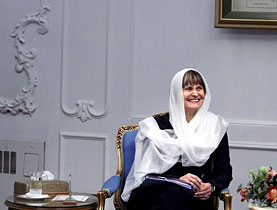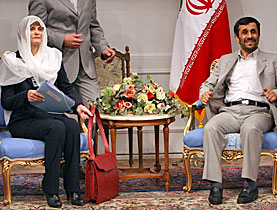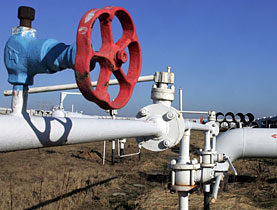Jewish group attacks Swiss-Iranian gas deal

The New York-based Anti-Defamation League (ADL) has condemned a Swiss-Iranian natural gas export deal, accusing Switzerland of financing terrorism.
The Swiss foreign ministry for its part repeated that the agreement violates neither United Nations Security Council resolutions imposing sanctions on Iran over its nuclear programme or US laws.
“As the Swiss government pursues its own narrow economic interests, it is bankrolling the world’s leading sponsor of terrorism,” declared one of the messages in the full-page advertisement the group took out in Tuesday’s edition of the Wall Street Journal, the New York Times and several other international and Swiss newspapers.
The Jewish association’s advert claimed that pro-Iranian Hezbollah missile teams in Lebanon, Hamas suicide bombers in Gaza, Iran’s own nuclear weapons programme and terrorist cells around the globe all stood to benefit from the energy deal.
“The reproaches in this advertisement do not fit the facts,” said foreign ministry spokesperson Lars Knuchel.
An agreement for the delivery of natural gas was signed in Tehran on March 17 between a private Swiss energy company and Iran in the presence of the Swiss foreign minister, Micheline Calmy-Rey.
Energy supply
The 25-year deal with National Iranian Gas Export Company (NIGEC) covers the delivery of 5.5 billion cubic metres of gas per year to Europe through a pipeline by 2012.
It is thought to be worth between €10 billion (SFr15.9 billion) and €22 billion, depending on factors such as the price of oil.
Calmy-Rey said in Tehran that the deal was important in the long term for both parties and said it was Switzerland’s strategy to diversify its source of energy supplies.
Switzerland currently buys its supplies in northern Europe (Norway, Netherlands, Germany), Algeria (through France) and Russia. Consumption of gas represents about 12 per cent of Switzerland’s energy needs.
“The gas contract signed between the Swiss and Iranian companies does not violate international sanctions taken by the United Nations and the US. Numerous countries which are much bigger than Switzerland maintain trade relations with Iran,” pointed out Knuchel.
These include the European Union, China and Japan. Switzerland does not feature on Iran’s list of top ten countries receiving Iranian exports, whether commercial goods or raw materials.
Switzerland uses its good offices to represent US interests in Iran and Iranian interests in Washington. The US and Iran broke off diplomatic relations in 1980.
Asked whether the deal might influence Switzerland’s mediation role, Knuchel added that a State Department spokesman had said last week there was no change in US policy.
Reactions
ADL director Abraham H. Foxman said Calmy-Rey’s decision to go to Iran was “irresponsible” and sent out the wrong signal to Iran.
“She should have known that she was being manipulated by the Iranians to show that they are not isolated,” he told swissinfo.
“The Swiss government has much to be embarrassed about with this gas deal, and has to take responsibility for its actions.
“Switzerland should be most embarrassed about what iran could use the money for: its nuclear weapons programme, buying missiles for Hezbollah, and financing Europe-based terrorist groups.”
The ADL is not the first organisation or country to react to the Iran gas deal.
The US said it was “disappointed” with the accord and has officially requested a copy of the contract to examine whether the deal violates UN sanctions against Iran. The World Jewish Congress and Israel have also attacked the gas deal.
Former Swiss ambassador François Nordmann told swissinfo the ADL response was a “cry of indignation, an individual reaction” to the deal. “It is an NGO’s attempt to influence public opinion and discredit Switzerland and its foreign ministry,” he said.
Nordmann did not think the criticism by the ADL and the US would have any consequences for Switzerland, adding it was not a matter for discussion between Switzerland and the Americans.
“The US applies its own sanctions. The Americans are also pushing for further sanctions at the UN… But Switzerland doesn’t have to answer to the United States over this deal.”
The Swiss Jewish community has meanwhile distanced itself from the ADL media campaign.
In an interview in the French-language 24 Heures newspaper, the president of the Swiss Federation of Jewish Communities, Alfred Donath, declined to give his support to the ADL, even if he was unhappy with the gas deal.
“The press campaign is meddling,” said Donath. “Its criticisms of Micheline Calmy-Rey are unfair and unwarranted. It’s the position of the government as a whole that should be discussed.”
Donath confirmed that he had been personally informed about the foreign minister’s visit to Iran. He said his view was that Calmy-Rey had not travelled to Tehran enthusiastically.
swissinfo with agencies
Persia – as Iran was then known – opened an embassy in Bern in 1917.
In 1919 Switzerland opened a consulate general in Tehran.
In 2005 there were 187 Swiss citizens living in Iran.
At the end of 2004, 3,801 Iranians were living in Switzerland.
The Anti-Defamation League (ADL) was founded in 1913 “to stop the defamation of the Jewish people and to secure justice and fair treatment to all”.
With an annual budget of over $50 million, the lobby group has 29 offices in the US and three offices in other countries, with its headquarters located in New York.
The ADL attacked Switzerland in the 1990s over their wartime record and their handling of Nazi Holocaust victims’ accounts.
Four regional companies import natural gas to Switzerland under the umbrella of Swissgas.
About 100 mainly public companies supply gas to households and the industry through a 16,000-kilometre network.
Approximately 1,700 people work for the Swiss gas industry, which has an annual turnover of SFr1.7 billion.
The use of natural gas in Switzerland represents about 12% of the nationwide energy consumption.

In compliance with the JTI standards
More: SWI swissinfo.ch certified by the Journalism Trust Initiative


You can find an overview of ongoing debates with our journalists here. Please join us!
If you want to start a conversation about a topic raised in this article or want to report factual errors, email us at english@swissinfo.ch.